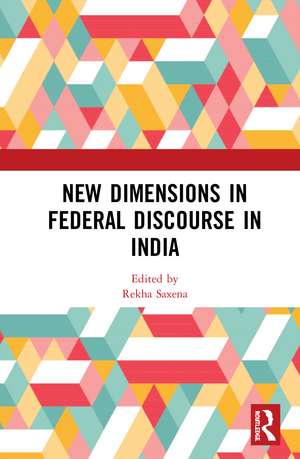New Dimensions in Federal Discourse in India
Editat de Rekha Saxenaen Limba Engleză Hardback – 21 dec 2020
The volume engages with several facets of federalism: administrative federalism; environmental and resource federalism; changing dynamics of fiscal federalism; and multi-level governance. With comparative data and case studies across different states of India, it brings together a range of issues, including Article 356 and its dysfunctions; land acquisition; decentralized governance; tribal rights; the roles of central and state governments; concerns regarding Citizenship Amendment Act; recent abrogation of Article 370 and 35 A; Delhi and statehood; climate change; MGNREGA; implementation of ICDS and the cooperative and competitive nature of Indian federalism.
Comprehensive and topical, this book will be useful to scholars and researchers of political science, federalism, comparative federal studies, political studies, comparative politics, public administration, governance and development studies. It will also interest policy makers, bureaucrats, government organizations, NGOs, and civil society activists.
| Toate formatele și edițiile | Preț | Express |
|---|---|---|
| Paperback (1) | 383.17 lei 6-8 săpt. | |
| Taylor & Francis – 25 sep 2023 | 383.17 lei 6-8 săpt. | |
| Hardback (1) | 1000.30 lei 6-8 săpt. | |
| Taylor & Francis – 21 dec 2020 | 1000.30 lei 6-8 săpt. |
Preț: 1000.30 lei
Preț vechi: 1219.88 lei
-18% Nou
Puncte Express: 1500
Preț estimativ în valută:
191.47€ • 208.05$ • 160.94£
191.47€ • 208.05$ • 160.94£
Carte tipărită la comandă
Livrare economică 21 aprilie-05 mai
Preluare comenzi: 021 569.72.76
Specificații
ISBN-13: 9781138361508
ISBN-10: 113836150X
Pagini: 244
Ilustrații: 20
Dimensiuni: 156 x 234 x 18 mm
Greutate: 0.45 kg
Ediția:1
Editura: Taylor & Francis
Colecția Routledge India
Locul publicării:Oxford, United Kingdom
ISBN-10: 113836150X
Pagini: 244
Ilustrații: 20
Dimensiuni: 156 x 234 x 18 mm
Greutate: 0.45 kg
Ediția:1
Editura: Taylor & Francis
Colecția Routledge India
Locul publicării:Oxford, United Kingdom
Public țintă
PostgraduateCuprins
Introduction: Dialectics of Collaborative and Competitive Federalism Part I. Administrative Federalism 1. Article 356 and its Dysfunctions: Analysis of its Misuse in Indian Federal System 2. Indian Forest Service: Mandate and State Governments 3. Telecom Regulatory Authority of India: Digital Sway versus Digital Sovereignty 4. Delhi and Statehood: Problematic Law and Order and Federal Trade-Off Part II. Environmental and Resource Federalism 5. Land Acquisition, Movement Actors and Federalism: The Anti-POSCO Movement in Odisha 6. Forest Governance, Tribal Rights and State: A Study of the Third Layer of Federal Structure in India 7. Climate Change and Sub-National Government: Uttar Pradesh Part III. Changing Dynamics of Fiscal Federalism 8. Regional Business Chambers and Federalization in India 9. Globalization, Welfare State and Cooperative Federalism in India 10. Evaluating Integrated child Development Scheme (ICDS) through Inter-Governmental Engagement: Jajpur District of Odisha 11. Role of Street-Level Bureaucrats in MGNREGS Implementation: Jharkhand
Recenzii
"In an era of populist nationalism, it is important to better understand Indian federalism. This book offers insightful perspectives on federalist cooperation and competition through practical case analyses of important policies."
John Kincaid, Professor, Lafayette College, Easton, Pennsylvania, USA
"Timely and well-documented. Young scholars throw light on varied aspects of the multilevel federal system which holds India together."
Balveer Arora, Chairman, Centre for Multilevel Federalism & Former Professor & Rector-Pro Vice-Chancellor, Jawaharlal Nehru University, India
"This book is a welcome contribution to scholarship exploring the operation of federal principles in the most highly populated federation in the world."
Nicholas Aroney, Professor Constitutional Law, University of Queensland, Australia
"This volume indeed lives up to its title in covering the new dimensions. Rekha Saxena has done a wonderful job of bringing together an upcoming crop of scholars to provide insights into current issues of federal practice in India. By looking at intergovernmental relations through the lens of globalization, environmental policy and fiscal federalism the volume provides readers with a better understanding of the imperatives and motivations behind recent policy choices made by governments in India. I highly recommend this volume for anyone interested in contemporary India."
Rupak Chattopadhyay, President and CEO, Forum of Federations, Canada
John Kincaid, Professor, Lafayette College, Easton, Pennsylvania, USA
"Timely and well-documented. Young scholars throw light on varied aspects of the multilevel federal system which holds India together."
Balveer Arora, Chairman, Centre for Multilevel Federalism & Former Professor & Rector-Pro Vice-Chancellor, Jawaharlal Nehru University, India
"This book is a welcome contribution to scholarship exploring the operation of federal principles in the most highly populated federation in the world."
Nicholas Aroney, Professor Constitutional Law, University of Queensland, Australia
"This volume indeed lives up to its title in covering the new dimensions. Rekha Saxena has done a wonderful job of bringing together an upcoming crop of scholars to provide insights into current issues of federal practice in India. By looking at intergovernmental relations through the lens of globalization, environmental policy and fiscal federalism the volume provides readers with a better understanding of the imperatives and motivations behind recent policy choices made by governments in India. I highly recommend this volume for anyone interested in contemporary India."
Rupak Chattopadhyay, President and CEO, Forum of Federations, Canada
Notă biografică
Rekha Saxena is Professor at the Department of Political Science, University of Delhi, India.
Descriere
This book explores continuities and changes in Indian federalism since independence and economic liberalization of the 1990s, and the rise of multi-party system and coalition governments. It examines administrative federalism; environmental and resource federalism; changing dynamics of fiscal federalism; and multi-level governance.
